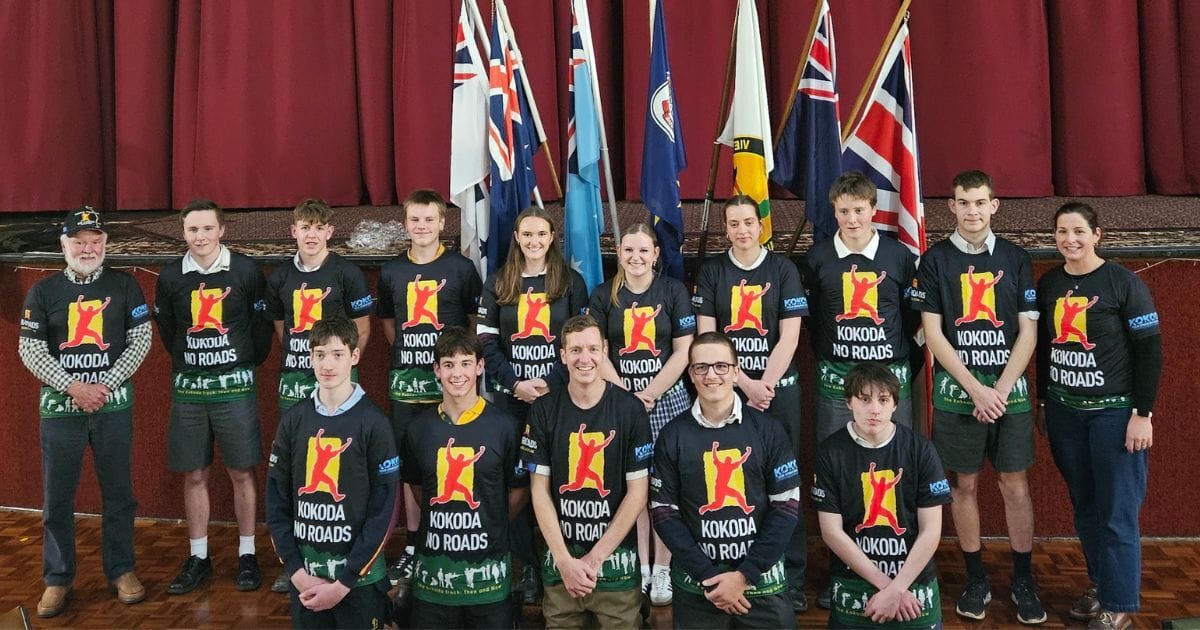Corangamite students gear up for a school holiday trip like no other, hiking the Kokoda trail
The journey will honour the Diggers who came before them, and push the young trekkers far beyond the classroom.

A dozen determined high school students from across Corangamite are set to tackle the task of conquering the Kokoda Track in Papua New Guinea, in a journey designed to test their limits and forge a deeper connection to the soldiers who once walked it in defence of Australia.

Led by local organiser Darcy Walsh of No Roads Expeditions, the nine-day, 100km trek aims to build leadership and resilience, and encourage an appreciation of Australia’s war history.
Walsh, a former Australian Army member, Cobden Tech graduate and seasoned Kokoda trekker, said the idea grew from a previous experience guiding Melbourne students along the track.
“Two years ago, I walked the Kokoda track with a group of Year 11 and 12 students from a Melbourne high school, and I got to watch from day one, right through to day nine when we finished the track, the growth of these students,” he said.
“The resilience of how they were able to push through moments where they wanted to stop and give up — they were in tears, they thought they couldn’t do it — and they finished the track. [They] accomplished it together as a team.”
Inspired by that transformation, Walsh approached Peter Walsh, MP for Murray Plains, to propose a similar program for young people in his home region.
“I wanted it to be a shire expedition, to bring all six of the high schools together, so that way it can strengthen the bonds between the community and the Corangamite Shire as a whole.”
Students from Camperdown College, Mercy Regional College, Timboon P-12, Cobden Technical School, Derinallum College and Terang College will join the trek, after months of preparation including monthly training hikes, each one ramping up in difficulty, both in distance and the weight carried.

But as Walsh explained, it’s not just a physical challenge.
“We hold services at a lot of historical places along the track, learning the history about why the villages were important, so that can be passed on to younger generations so that this information isn’t forgotten about,” he said.
“Because without the soldiers that fought on the track, Australia could have been a very different place.”
Among the participants is Zach Regan, a Year 11 student at Camperdown College, who said his motivation stemmed from a personal connection to Australia’s military history.
“A few of our family’s ancestors [didn’t fight] in Kokoda, but [they fought] in different wars, so we’re seeing what it’s sort of like and what the people who fought in Kokoda had to go through,” he said.
It’ll be Zach’s first time travelling overseas, and he’s especially excited by the chance to explore a new environment. He’s also enjoyed building friendships during the training sessions.
His brother, Lewis Regan, a Year 12 student, said doing the trek not only with his younger sibling, but also their cousin, was an exciting thought.
“I didn’t know our cousin Riley was doing it — it was a bit of a surprise when he went to the first training and we saw him there,” he said.
Brody Hanks, a Year 12 student from Mercy Regional College, was similarly driven by family legacy, with relatives who served in World War I, World War II and other deployments. He said he also hoped to join the army one day.
Brody said he was looking forward to “learning about the new culture over there and experiencing that, and seeing how they live and their day to day lives compared to us back home here”.

This year’s expedition includes an extended stay in a local Papuan village. The group will arrive a day early in the village of Kagi, giving them time to immerse themselves in community life.
“The thing I’m looking forward to the most is taking the students down to the school of Kavovo,” Walsh said.
During their stay, the students will help build huts and learn traditional cooking techniques alongside villagers.
“Hopefully it brings things into perspective for them so when they come home, they’re appreciative of what they have and they can become young leaders,” Walsh said.
“[They will see] that they can do whatever they put their minds to, because walking 100 kilometres over the Owen Stanley Range may be one of the toughest things that a lot of people have done.”

The group sets off this Sunday and will be completely off-grid — no phone signal, no outside contact — for the duration of their trek.
